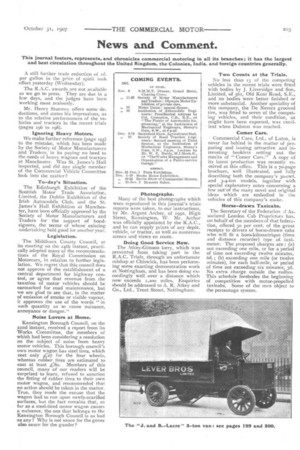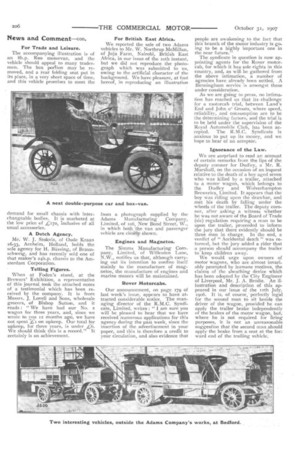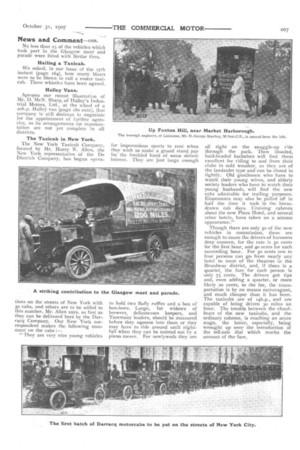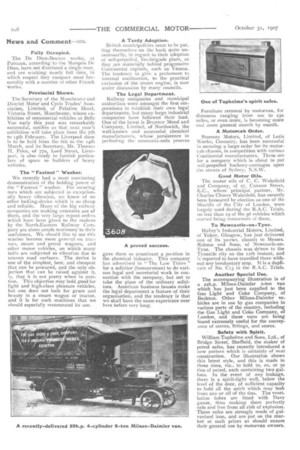News and Comment.
Page 11

Page 12

Page 13

Page 14

If you've noticed an error in this article please click here to report it so we can fix it.
This journal fosters, represents, and chronicles commercial motoring in all its branches ; it has the largest and best circulation throughont the United Kingdom, the Colonies, India, and foreign countries generally.
A still further trade reduction of id. per gallon in the price of spirit took effect yesterday (Wednesday).
The R.A.C. awards are not available as we go to press. They are due in a few days, and the judges have been working most zealously.
Mr. Henry Sturmev offers some deductions, and states his impressions, as to the relative performances of the vehicles and tractors in the recent trials (pages 196 to 198).
Ignoring Heavy Motors.
We make further reference (page 195) to the mistake, which has been made by the Society of Motor Manufacturers and Traders, in its paying no heed to the needs of heavy wagons and tractors at Manchester. Was St. James's Hall inspected, and did any single member of the Commercial Vehicle Committee look into the matter?
To-,day's Situation.
The Edinburgh Exhibition of the Scottish Motor Trade Association, Limited, the Dublin Exhibition of the Irish Automobile Club, and the St. James's Hall Exhibition at Manchester, have been officially approved by the Society of Motor Manufacturers and Traders for the support of bondsigners, the terms of whose existing undertaking hold good for another year.
Legislation.
The Middlesex County Council, at its meeting on the 24th instant, practically adopted many of the recommendations of the Royal Commission on Motorcars, in relation to further legislation. We regret that this council does not approve of the establishment of a central department for highway control, or agree that revenue from the taxation of motor vehicles should be earmarked for road maintenance, but we are glad to see that, in the matter of emission of smoke or visible vapour, it approves the use of the words "in such quantity as to cause nuisance, annoyance or danger."
Noise Lovers at Home.
Kensington Borough Council, on the 22nd instant, received a report from its Works Committee, the members of which had been considering a resolution on the subject of noise from heavy motor vehicles. This borough council's own motor wagon has steel tires, which cost only .42.7 for the four wheels, whereas rubber tires are estimated to cost at least ‘80. Members of this council, many of our readers will be surprised to fearn, refused to sanction the fitting of rubber tires to their own motor wagon, and recommended that no action should be taken in the matter. True, they made the excuse that the wagon had to run upon newly-scarified surfaces, but the fact remains that, so far as a steel-tired motor wagon causes a nuisance, the one that belongs to the Kensington Borough Council is as bad as any! Why is not sauce for the goose also sauce for the gander ? Photographs.
Many of the best photographs which were reproduced in this journal's trials reports were taken, to our instructions, by Mr. Argent Archer, of 195a, High Street, Kensington, W. Mr. Archer was officially appointed by the R.A.C., and he can supply prints of any depot, vehicle, or tractor, as well as numerous scenes and views en route.
Doing Good Service Now.
The Atkev-Girnson lorry, which was prevented from taking part in the R.A.C. Trials, through an unfortunate mishap at Chiswick, has been performing some exacting demonstration work at Nottingham, and has been doing exceedingly well over a distance which now exceeds 1,2oo miles. Enquiries should be addressed to A. R. Atkey and Co. Ltd., Trent Street, Nottingham. Two Counts at the Trials.
No less than 13 of the competing vehicles in the recent trials were fitted with bodies by J. Liversidg-e and Son, Limited, of 561, Old Kent Road, S.F., and no bodies were better finished or more substantial. Another speciality of this company, the De Nevers grooved tire, was fitted to seven of the competinc vehicles, and their condition, as might have been expected, was excellent when Dalston was reached.
Comer Cars.
Commercial Cars, Ltd., of Luton, is never far behind in the matter of preparing and issuing attractive and interesting booklets setting out the merits of " Cotner Cars." A copy of its latest production was recently received at this office. This is a 70-page brochure, well illustrated, and fully describing both the company's 3o-cwt. and 3-4-ton models, together with special explanatory notes concerning a few out of the many novel and original ideas which are embodied in the vehicles of this company's make.
Horse-drawn Taxicabs.
The Secretary of the Federation if Associated London Cab Proprietors has, on behalf of the members of that federation, offered 30 per cent, of the gross receipts to drivers of horse-drawn cabs who will fit a horo-kilometrique (time and distance recorder) type of taximeter. The proposed charges are : (a) not exceeding one mile, or for a period of time not exceeding twelve minutes, 6d. ; (b) exceeding one mile (or twelve minutes), for each half-mile, or period of time not exceeding six minutes, 3d. No extra charge outside the radius. This schedule forebodes the beginning of competition with motor-propelled taxicabs. Some of the men object to the percentage system.
For Trade and Leisure.
The accompanying illustration is of an 8h.p. Reo motorvan, and the vehicle should appeal to many tradesmen. The box podion may be removed, and a rear folding seat put in its place, in a very short space of time, and this vehicle promises to meet the demand for small chassis with interchangeable bodies. It is marketed at the low price of ,170, inclusive of all usual accessories.
A Dutch Agency,
Mr. W. J. Stokvis, of Oude Kraan 16-33, Arnheim, Holland, holds the sole agency for H. Bussing, of Braunschweig, and has recently sold one of that maker's 24h.p. chassis to the Amsterdam Corporation.
• Telling Figures.
When at Foden's stand, at the Brewers' Exhibition, a representative of this journal took the attached notes of a testimonial which has been received by the company. It is from Messrs. J. Lovell and Sons, wholesale grocers, of Bishop Sutton, and it reads : "We have had our No. wagon for three years, and, since we wrote to you 12 months ago, we have not spent 74_-6,t on upkeep. Our total for upkeep, for three years, is under We should think this is a record," It certainly is an achievement.
For British East Africa.
We reported the sale of two Adams vehicles to Mr. W. Northrup McMillan, of Juja Farm, Nairobi, British East Africa, in our issue of the loth instant, but we did not reproduce the photograph which was submitted to us, owing to the artificial character of the background. We have pleasure, at foot hereof, in reproducing an illustration from a photograph supplied by the Adams Manufacturing Company, Limited, of to6, New Bond Street, W., in which both the van and passenger vehicle are deafly shown.
, Engines and Magnetos.
The Simms Manufacturing Company, Limited, of Willesden Lane, N.W,, notifies us .that, althoughcarrying out its intention to confine itself mainly to the manufacture of magnetos, the manufacture of engines and marine motors will be maintained.
Rover Motorcabs.
Our announcement, on page 179 of last week's issue, appears to have attracted considerable notice. The managing director of the R.M.C. Syndicate, Limited, writes : " I am sure you will be pleased to hear that we have received numerous applications for this agency during the past week, since the insertion of the advertisement in your paper, and this is therefore a credit to your circulation, and also evidence that
people are awakening to the fact that this branch of the motor industry is go., ing to be a highly important one in the near future."
The syndicate in question is now appointing agents for the Rover motorcab, for which it has sole rights in this country, and, as will be gathered from the above intimation, a number of agencies have already been settled. A Birmingham service is amongst those under consideration.
As we are going to press, no intimation has reached us that its challenge for a motorcah trial, between Land's End and John o' Groats, where speed, reliability, and consumption are to be the determining factors, and the trial is to be held under the supervision of the Royal Automobile Club, has been accepted. The R.M.C. Syndicate is anxious to put up its money, and we hope to hear of an acceptor.
Ignorance of the Law.
We are surprised to read an account of certain remarks from the lips of the deputy coroner for Dudley, a Mr. R. Marshall, on the occasion of an inquest relative to the death of a boy aged seven who was killed by a trailer, attached to a motor wagon, which belongs, to the Dudley and Wolverhampton Breweries, Limited. It appears that the by was riding upon the drawbar, and met his death by falling under the wheels of the trailer. The deputy coroner, after asking a witness whether he was not aware of the Board of Trade (sic) regulation requiring a man to be upon the trailer, proceeded to inform the jury that there evidently should be three men in charge. In the end, a verdict of "Accidental death " was returned, but the jury added a rider that a person should accompany the trailer to keep children away.
We would urge upon owners of motor wagons, who are almost invariably prompted by humane motives, the claims of the sheathing device Whieh has been adopted by the City Engineer of Liverpool, Mr. J. A. Brodie,
lustration and description of this appeared in our issue of the 12th July, 1906. It is, of course, 'perfectly legal for the second man to sit beside the driver of the wagon, provided' he can apply the trailer brake independently of the brakes of the motor wagon; but, where he is not required for firing purposes, it is not an unreasonable suggestion that the second man,should apply the brake from a seat at the for= ward end of the trailing vehicle: No less than 23 of the vehicles which took part in the Glasgow meet and parade were fitted with Sirdar fires.
Hailing a Taxicab.
We asked, in our issue of the 17th instant (page 164), how many blasts were to be blown to call a motor taxicab. Three whistles have been agreed.
Halley Vans.
Apropos our recent illustration of Mr. D. McN. Sharp, of Halley's Industrial Motors, Ltd., at the wheel of a 2oh.p. Halley van (page 18o ante), that company is still desirous to negotiate for the appointment of -further agencies, as its arrangements for representation are not yet complete in all districts.
The Taxicab in New York.
The New York Taxicab Company, formed by Mr. Harry N. Allen, the New York representative of the De Dietrich Company, has begun opera tiOns on the streets of New York with so cabs, and others are to be added to this number, Mr. Allen says, as fast as they can be delivered here by the Darracq Company. Our New York correspondent makes the following comment on the cabs :— " They are very nice young vehicles for impecunious sports to rent when they wish to make a grand stand pay for the freckled hand of some skinny heiress. They are just large enough to hold two fluffy ruffles and a box of bon-bons. Large, fat widows of brewers, delicatessen keepers, and Tammany leaders, should be measured before they squeeze into them or they may have to ride around until nightfall when they can be ooisted out by a piano mover. For newlyweds they are all right on the snuggle-up ride through the park. Then blooded, bald-headed bachelors will find them excellent for riding to and from their clubs in cold weather, as they are of the landaulet type and can be closed in tightly. Old gentlemen who have to watch their young wives, and elderly society leaders who have to watch their young husbands, will find the new cabs admirable for trailing purposes. Elopements may also be pulled off in half the time it took in the horsedrawn cab days. Cruising cabmen about the new Plaza Hotel, and several other hotels, have taken on a solemn appearance."
Though there are only so of the new vehicles in commission, these are enough to cause the drivers of hansoms deep concern, for the rate is 50 cents for the first hour, and 40 cents for each succeeding hour. For 30 cents one to four persons can go from nearly any hotel to most of the theatres in the Broadway district, and, if there is a quartet, the fare for each person is only 71 cents. The drivers get tips and, even adding a quarter, or more likely 20 cents, to the fee, the transportation is by no means extravagant, and much cheaper than it has been. The taxicabs are of r4h.p., and are capable of being driven 30 miles an hour. The trouble between the chauffeurs of the new taxicabs, and the ordinary cabmen, is reaching an acute stage, the latter, especially, being wrought up over the introduction of the tell-tale dial which marks the amount of the fare.
Fully Occupied.
The De Dion-Bouton works, at Puteaux, according to the Marquis 1k Dion, have not dismissed a single man, and are working nearly full time, in which respect they compare most favourably with a number of other French works.
Provincial Shows.
The Secretary of the Manchester and District Motor and Cycle Trades' Association, Limited, of Palatine Hotel, Victoria Street, Manchester, whose exhibition of commercial vehicles at Belle Vue early this year was remarkably successful, notifies us that next year's exhibition will take place from the 7th to 15th February. The Liverpool show is to be held from the 6th to the ti.th March, and its Secretary, Mr. Thomas II. Price, of 77a,, Lord Street, Liverpool, is also ready to furnish particulars of space to builders of heavy vehicles.
The " Fastnut " Washer.
We recently had a most convincing demonstration of the holding power of the " Fastnut " washer. For securing nuts which are subjected to exceptionally heavy vibration, we know of no other locking-device which is so cheap and reliable. Many of the big railway companies are making extensive use of them, and the very large repeat orders which have been given to the makers by the North-Eastern Railway CamPany are alone ample testimony to their usefulness. We should like to see this washer become more general on tractors, steam and petrol wagons, and other motor vehicles, on which many bolts are subjected to vibration due to uneven road surfaces. The device is one of the simplest, best, and cheapest that can be procured, and the only objection that can be raised against it, is, that it is not pretty when in position. This objection may hold good for light and high-class pleasure vehicles, but one does not look for grace and beauty in a steam wagon or tractor, and it is for such machines that we should especially recommend its use.
A Tardy Adoption.
British municipalities seem to be pat_ ting, themselves on the back quite unnecessarily, in regard to their adoption of self-propelled, fire-brigade plant, as they are materially behind progressive Continental capitals, such as Vienna. The tendency to give a preference to internal combustion, to the practical exclusion of the steam engine, is now under discussion by many councils.
The Legal Department.
Railway companies and municipal authorities were amongst the first corporations to establish their own legal departments, but many large industrial companies have followed their lead. One of the latest is Brunner Mond and Company, Limited, of Northwich, the well-known and successful chemical manufacturers, whose persistence in perfecting the ammonia-soda process gave them so prominent a position in the chemical industry. This company has advertised in " The Law Times " for a solicitor (honoursman) to do various legal and secretarial work in connection with the company, but not to take the place of the ordinary solicitors. American business houses make the legal department a feature of their organisation, and the tendency is that we shall have the same experience over here before very long. Furniture removal by motorvan, for distances ranging from moo to 250 miles, or even more, is becoming more and more general month by month.
A Motorcab Order.
Sturrney Motors, Limited, of Lotis Works, Coventry, has been successful in securing a large order for its motorcab chassis, in competition with various Continental manufacturers. These are for a company which is about to put self-propelled hackney-carriages upon the streets of Sydney, N.S.W.
Good Motor Oils.
The motor oils of C. C. Wakefield and Company, of 27, Cannon Street, E.C., whose principal partner, Mr. Charles Cheers Wakefield, has recently been honoured by election as one of the Sheriffs of the City of London, were largely used during the R.A.C. Trials, no less than 19 of the 56 vehicles which started being consumers of them.
To Newcastle,on-Tyne.
Halley's industrial Motors, Limited, of Yoker, Glasgow, has just delivered one of its 3o-cwt. chassis to Messrs. Robson and Sons, of Newcastle-onTyne. The chassis was driven to the Tyneside city on the mith instant, and is reported to have travelled there without any involuntary stop. It is a duplicate of No. C13 in the R.A.C. Trials.
Another Special Use.
The accompanying illustration is of a 22h.p. Milnes-Daimler 2-ton van which has just been supplied to the Gas Light and Coke Company, of I3eckton. Other Milnes-Daimler vehicles are in use by gas companies in various parts of the country, including the Gas Light and Coke Company, of London, and these vans are being found extremely useful for the conveyance of stoves, fittings, and stores.
Safety with Spirit.
William Tupholme and Sons, Ltd., of Bridge Street, Sheffield, the maker of petrol safes, has recently introduced a new pattern which is certainly of neat construction. Our illustration shows this latest style, and this is made in three sizes, viz., to hold to, 20, or 30 tins of petrol, each containing two gallons. In the event of any leakage, there is a spirit-tight well, below the level of the door, of sufficient capacity to hold all the spirit which may leak from any or all of the tins. The ventilation tubes are fitted with Davy gauze, thus making them perfectly safe and free from all risk of explosion. These safes are strongly made of galvanised iron, and are put on the market at such prices as should ensure their general use by motorvan owners.
























